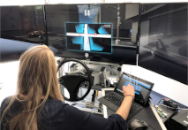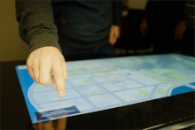Forschung
Arbeitsgruppen Medieninformatik und Mensch-Maschine-Interaktion
Leitbild Die Arbeitsgruppe Medieninformatik und Mensch-Maschine-Interaktion besteht aus zwei Lehrstühlen, dem Lehrstuhl für Angewandte Informatik und Medieninformatik und dem Lehrstuhl für Mensch-Maschine-Interaktion. Beide führen Forschung an der Grenze zwischen menschlichem Verhalten und Computern durch. Dies umfasst eine Vielfalt an Themen, wie der Entwicklung von neuen Interaktionstechnologien, Methodologien sowie die Durchführung von Anwendungs- und Fallstudien.
Wir haben das Ziel unsere Arbeit auf einem internationalen Level zu präsentieren und zielen daher auf internationale Forschungspublikationsmedien ab. Parallel dazu halten wir Kontakt zu lokalen Firmen zum Zweck der Anwendungsforschung.




Um einen ersten Eindruck von unserer Arbeit zu bekommen, finden Sie im folgenden Abschnitt einige Beispiele für aktuelle Forschungsbereiche und -fragen. Für ausführlichere Informationen sowie Publikationen besuchen Sie jedoch bitte die persönlichen Webseiten unserer Mitarbeiter.
- Forschung zu Virtual, Augmented und Mixed Reality
-
- Erforschung der Trainingsunterstützung beim Sport
- MR, VR und AR im Auto: Konzepte zur Interaktion sowie Sicherheit und Komfort
- Einsatz von Augmented Reality beim Lernen
- Forschung an der Schnittstelle zwischen Künstlicher Intelligenz und User Experience Design
-
- Modellierung menschlicher Verhaltensmuster für die nächste Generation interaktiver Systeme mit Hilfe von maschinellem Lernen
- Affective Computing
-
- Erkennung und Visualisierung affektiver Zustände aus non-verbaler Kommunikation anhand von Körpersprache, räumlichem Verhalten, etc.
- Emotionserkennung mit Fokus auf Stresserkennung
- Verarbeitung von Sprachsignalen und die Erkennung von Sprachemotionen
- Nutzung allgegenwärtiger mobiler Geräte
-
- Wie können Sensorfähigkeiten mobiler Geräte für adaptive Anwendungen genutzt werden, ohne gleichzeitig die Privatsphäre des Nutzers zu gefährden?
- Wie kann Technologie zur Prävention, Erkennung und Intervention von depressiven Verstimmungen beitragen? Da Smartphones zu einem Teil unseres täglichen Lebens geworden sind, bergen sie ein großes Potenzial, das Verhalten und die psychische Gesundheit des Nutzers zu reflektieren und Frühwarnzeichen zu geben
- Wie beeinflussen allgegenwärtige Technologien unsere Präsenz und unser allgemeines Wohlbefinden in der realen Welt?
- Forschung an neuen Interaktionskonzepten
-
- Eye-Tracking für die Mensch-Computer-Interaktion
- Tangible User Interfaces für kollaboratives Lernen
- Tangible Interaction für kreatives Lernen, wie z.B. Zeichnen und Musikkomposition
- Mensch-Roboter-Interaktion & Soziale Robotik
-
- Mensch-Roboter-Interaktinskonzepte
- Smart Home Environments mit Raum-Assisstenten
- Technische Lösungen zur Unterstützung von Selbstreflexionsprozessen
-
- Decision Support Systems im Kontext von Studien- und Berufswahl
- Digital Well Being
- Interaktionsdesign an öffentlichen, städtischen Orten
-
- Entwicklung von Designstrategien für die Einbettung von Schnittstellen im Außenbereich zur Wiederbelebung und Bereicherung der Stadtgeschichte und Kunst
